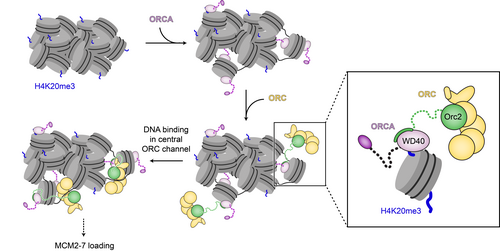
August 21, 2023
Replication of chromosomal DNA requires that replication machineries are assembled across the entire genome so that no DNA is left unreplicated. Incomplete DNA replication poses a major threat to genome integrity and can cause human diseases such as cancer. In the nucleus of eukaryotic cells, DNA is packed into nucleosomes and chromatin, but how cells accomplish DNA replication in chromatin is poorly understood.
Latest work from the Bleichert lab reveals that a protein that associates with the replication initiator ORC inhibits chromatin compaction. This protein, known as ORCA, binds specific modifications on nucleosomes found in repressed, compacted chromatin. Using X-ray-crystallography and cryo-EM, the Bleichert Lab shines light on the molecular interactions that promote the recruitment of ORCA and ORC to these nucleosomes. Surprisingly, the authors also uncover that ORCA alters the way nucleosomes self-associate during chromatin condensation. These exciting findings provide a physical mechanism for how initiation proteins can increase DNA accessibility in condensed chromatin environments in preparation for DNA replication.
Going forward, it will be important to define how the strategies that cells use to ensure efficient replication vary in different types of chromatin. The authors hope that delineating molecular mechanisms of chromatin replication will identify new therapeutic targets for treating diseases linked to genome instability.
This work was published in EMBO Journal: https://www.embopress.org/doi/full/10.15252/embj.2023114654